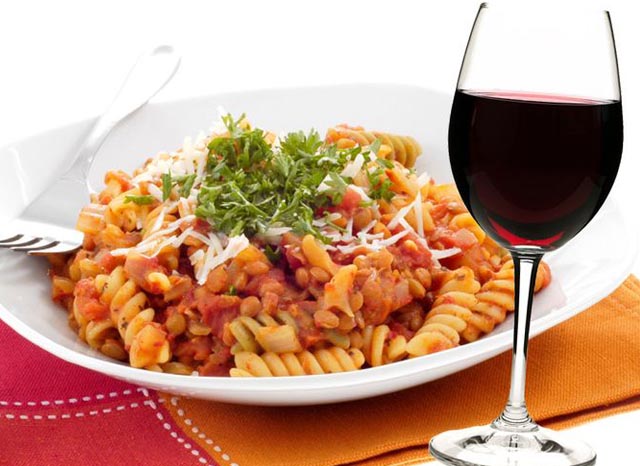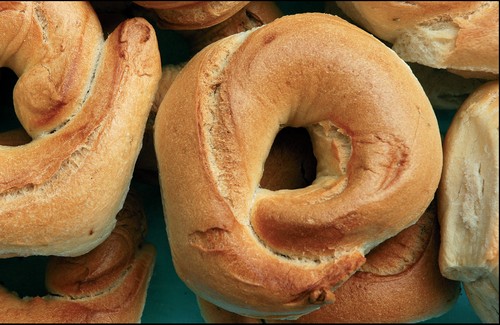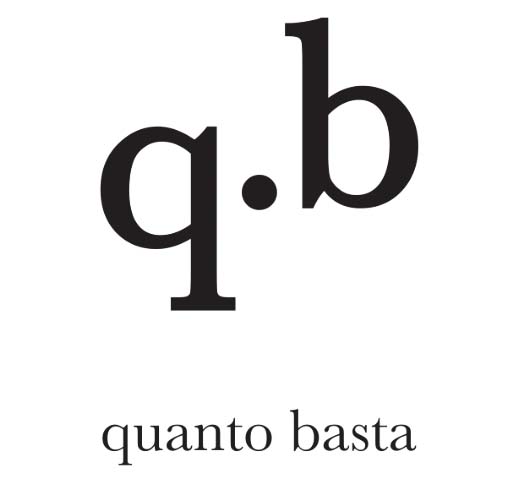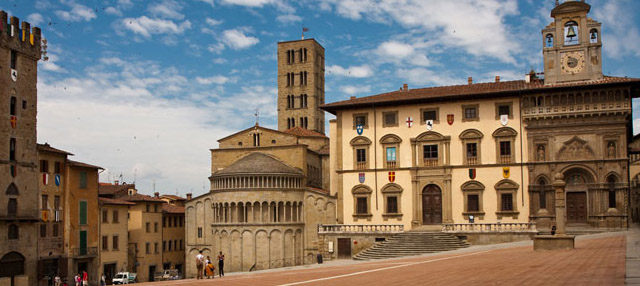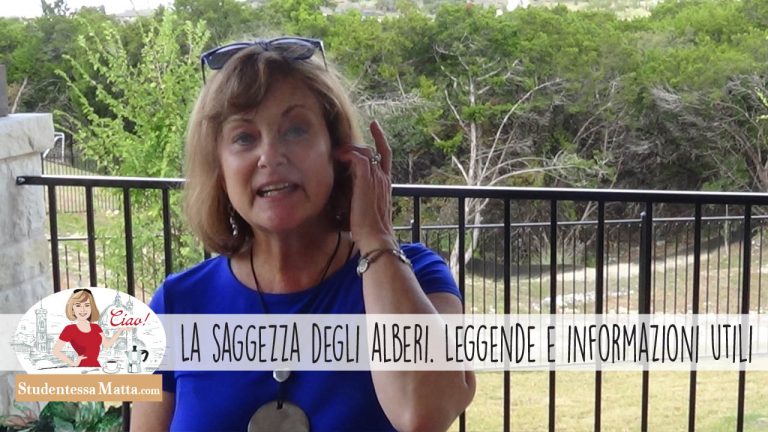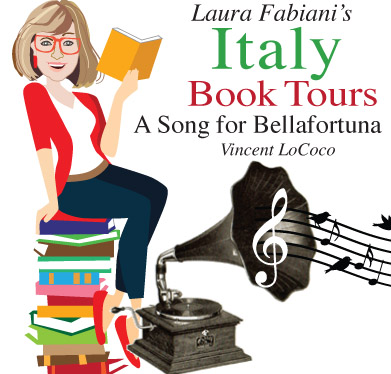La scorsa settimana ho creato un video sulle espressioni italiane che coinvolgono animali. Molte persone mi hanno risposto dicendo che l’hanno apprezzato. Sembra che voi siate interessati a saperne di più sulle strane espressioni idiomatiche e sul clima culturale da cui derivano. Con questo in mente, ho deciso di fare un altro video sui detti. Questa volta mi concentrerò sui modi di dire che trattano del cibo. Dopo aver visto il video penso che sarete pronti per tuffarvi in una grande ciotola di pasta, seguito da un buon bicchiere di vino. Non andate via. Torno subito.
Last week I put together a video about Italian idioms involving animals, and many people responded that they enjoyed it. You guys are interested in learning more about quirky idiomatic expressions and the cultural climate from which they are derived. With this in mind, I decided to make another video about idioms. This time I will focus on expressions that have to do with food! By the time we are through, you will want to dive into a big bowl of pasta and then chase it down with a nice glass of wine! Are you ready? Don’t go away! I’ll be right back.
Recentemente stavo lavorando sul compito con la mia amica Gloria, che è un’insegnante d’italiano e con cui mi incontro ogni settimana per bere un espresso e fare due chiacchiere. Gloria è anche una cantante. In cambio di aiutarmi a rispolverare la mia grammatica italiana, l’aiuto a disegnare le sue etichette per i CD e le copertine degli album. Ci divertiamo molto insieme.
I recently worked on a couple of translation exercises with my good friend Gloria, an Italian teacher. I meet up every week to drink an espresso and chat in Italian. Gloria is also a singer, and in exchange for helping me brush up on my Italian grammar, I help her design her CD labels and album covers. We have a lot of fun together.
Purché Gloria è un tipo creativo, non so mai che tipo di compito mi darà. Infatti l’altro giorno mi ha dato alcune frase di tradurre che pensavo che fossero un po’ strane.Volete sapere le frase? Va bene. Eccole:
Because Gloria is creative, I never know what exercises she will give me. The other day, she gave me some sentences to translate that I thought were a bit weird. Do you want to know the sentences? Okay, here there are:

“Ho sentito dire che nelle Galapagos c’è una varietà di uccelli incredibili; ne avete visti molti? Sì, ma non così tanti come abbiamo visto durante il viaggio in Madagascar, dove c’è una grande varietà di animali. Abbiamo fatto un’indigestione di loro.“
In Inglese: I have been told that in the Galapagos, there is an incredible variety of birds; have you seen many of them? Yes, but not as many as we saw during our trip to Madagascar, where there was a huge variety of animals. We made an “indigestion” of them!
Quando ho letto la frase: “Abbiamo fatto un’indigestione di loro” il primo pensiero era… che strano! Capivo che l’intensione della frase era “abbiamo visto tanti uccelli” però in inglese non avrò mai scelto la parola “indigestion” per comunicare questo. Usiamo invece la parola “over-dose” per comunicare essere sopraffato da una grande quantità di qualcosa.
When I read in English the sentence: “We made an “indigestion” of them,” my first thought was…how weird! I understood the gist of the sentence and that the idea was that “we had seen a lot of birds.” But in English, we would never choose the word “indigestion” to communicate this. We use instead of words like “over-dose” or OD-ing to communicate being overwhelmed by a large quantity of something.
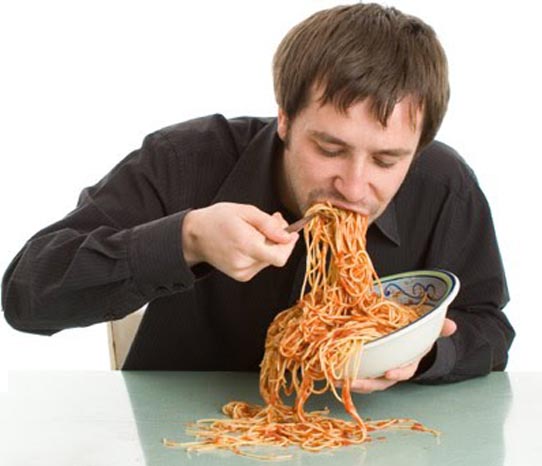
Quando ho spiegato questo a Gloria, lei ha risposto: “Davvero? In italiano non si usa mai la parola “overdose” per qualcosa che non sia una questione correlata alla droga. Ha riso, scrollava le spalle e ha detto: In Italiano invece tutto ruota attorno alla tavola e il cibo!
When I mentioned this to Gloria, she said, “Davvero?” In Italian, you never use the word “overdose” for anything but a drug-related thing. She laughed, shrugged her shoulders, and said instead, in Italian, everything revolves around food!
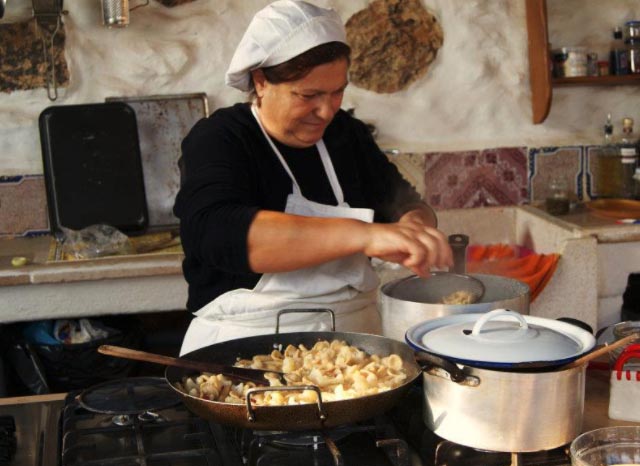
Ha ragione lei. Pensando ai detti che trattano di cibo, ce ne sono tanti! Ecco alcuni dei miei preferiti.
She is right. Thinking about expressions that have to do with food, there are a lot of them. Here are some of my favorites.
Aspettate un momento…scusate se ripeto di nuovo quest’espressione: “Aver il prosciutto sugli occhi.” Credo di averla usata in un video precedente, ma, penso che sia un’espressione molto buffa. Se qualcuno ha il prosciutto sopra gli occhi significa che la persona sta fingendo che la situazione non esista. Non si vede nulla con il prosciutto che copra gli occhi. In inglese c’è un’espressione simile: “essere uno struzzo” o “nascondere la testa nella sabbia.”
Hold on a minute…I apologize for repeating myself with this expression: “Aver il prosciutto (o salame) sugli occhi.” I’ve used it in a previous video, but it is a hilarious expression. If someone has ham over their eyes, they are pretending the situation doesn’t exist. You can’t see anything if you have ham covering your eyes. In English, a similar expression would be: “to be an Ostrich” or to “hide your head in the sand.”
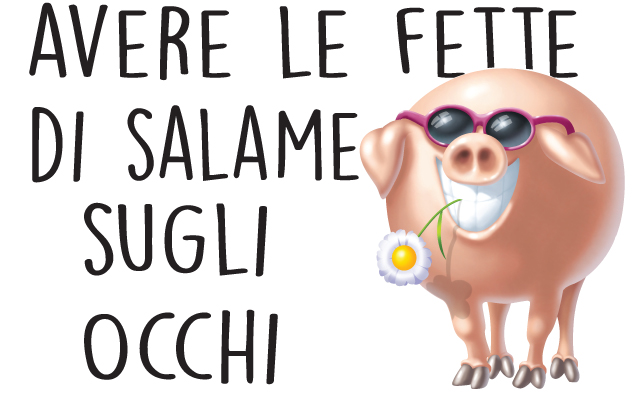
Un’altra espressione è: “Conosco i miei polli.” Apparentemente se conoscete i vostri polli significa che sapete davvero di che cosa state parlando.
Another expression is: “Conosco i miei polli.” I know my chickens. Apparently, if you know your chickens, you really do know what you are talking about.
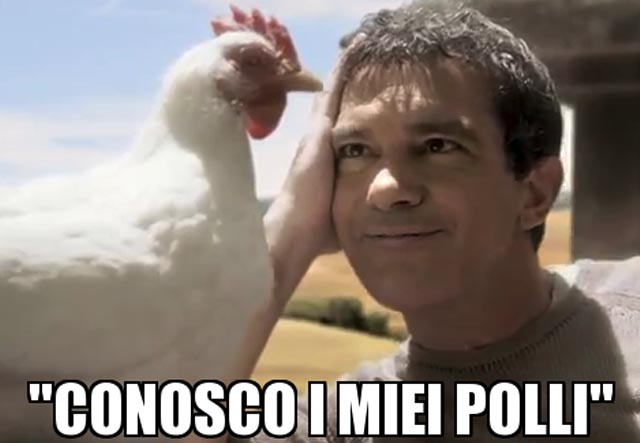
Poi c’è “fare polpette di qualcuno.” Quando tritate la carne per fare le polpette, solo i piccoli pezzi rimangono e la carne perde la sua consistenza e diventa molto malleabile. È lo stesso con la vostra concorrenza. La trasformerete in piccoli pezzi come carne macinata.
Then there is “Fare polpette di qualcuno.” When you chop up meat your meat to make meatballs, only the small pieces remain, and the meat loses its consistency and becomes very malleable. It is the same with your competition. You turn it into tiny pieces like minced meat.
Ci sono i detti che parlano di spezie, erbe o verdure, pane e zuppa. Per esempio: “Sei come il prezzemolo.” Il prezzemolo cresce dappertutto e l’espressione significa che una persona è sempre tra i piedi o sempre nel mezzo di tutto.
Some idioms talk about spices, herbs or vegetables, bread, and soup. For example: “Sei come il prezzemolo.” Parsley grows everywhere, and the expression means that a person is always underfoot and in the middle of everything.
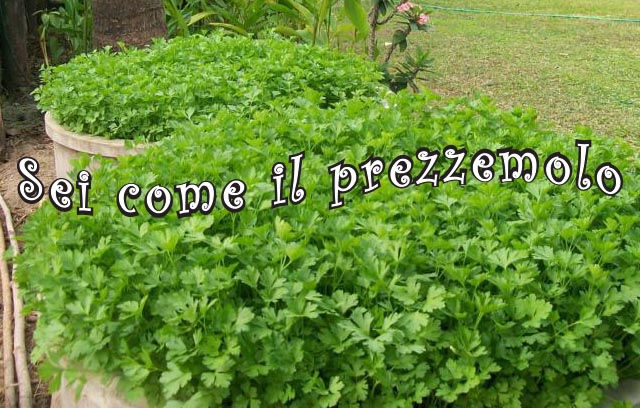
D’altra parte: “è tutto pepe! è usato per descrivere qualcuno che è pieno di vita e ha una personalità vivace o un atteggiamento solare. Se qualcuno vi dice questa espressione è un complimento.
On the other hand: È tutto pepe! is used to describe somebody who is full of life and has a vibrant personality or a sunny disposition. If you hear this expression, it is a compliment.
“Vestirsi a cipolla” significa vestirsi in un modo intelligente con tanti vestiti uno sopra l’altro. Per esempio un giorno potrebbe iniziare il freddo, quindi qualcuno che si veste a cipolla potrebbe indossare una maglietta, poi una camicia, poi un maglione. Man mano che il giorno diventa più caldo, può togliere i suoi diversi strati per stare bene.
“Vestirsi a cipolla” means to dress like an onion. In other words, to dress intelligently in layers. As the day might start cold, someone who dresses like a cipolla might wear a t-shirt, over which is a button-down shirt, over which is a sweater. As the day grows warmer, he can shed his layers and not be uncomfortable.
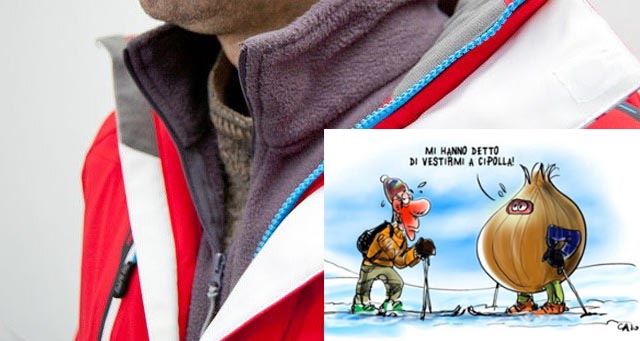
Una persona può essere “buona come il pane” e “brutta come la fame.” La prima espressione “buono come il pane” significa che qualcuno è una brava persona. Dopo tutto, il pane è il cibo perfetto, no? “Brutto come la fame” d’altra parte, non è un complimento. La fame non è mai una buona cosa e di solito qualcuno è piuttosto irritabile e ha una brutta disposizione se non mangia da un po’ di tempo.
A person can be “buona come il pane” and “brutto come la fame.” The first expression, “buon come il pane” means you are a good person. Bread, after all, is the perfect food. “Brutto come la fame,” on the other hand, means isn’t so complimentary. Hunger is never a good thing, and usually, someone is quite irritable and has an ugly disposition when they haven’t eaten something in a while.
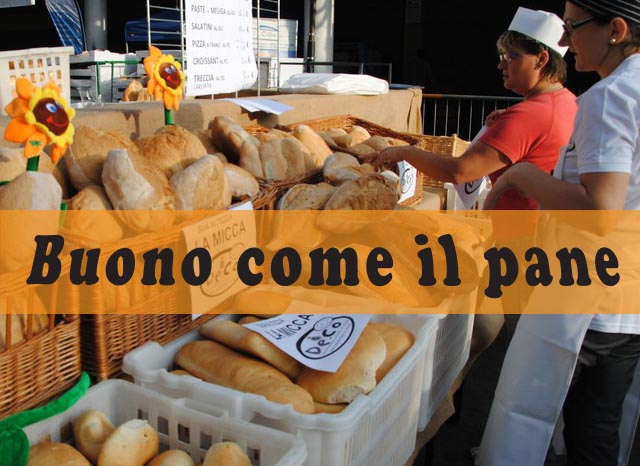
C’è anche: “dire pane al pane e vino al vino.” In inglese diciamo “to call a spade a spade” o dirlo come è, non dire bugie o addolcire i fatti. Questo proverbio vi incoraggia a non mentire e di parlare onestamente di un argomento.
There is also “dire pane al pane e vino al vino.” In English, we say “to call a spade a spade” or tell it like it is and not to lie or not sugar coat the facts. This proverb encourages you not to lie and to speak honestly about a topic.
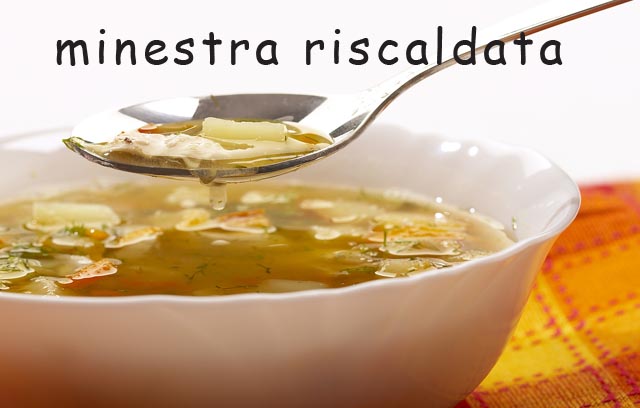
Altre espressioni alimentari includono “minestra riscaldata” che viene usato per parlare di una relazione che si trova in un stato di rinascita. Potrebbe riferirsi a una relazione che è diventata aspra e due amanti stanno cercando di tornare insieme, così come un legame tra due amici o partner commerciali che stanno cercando di lavorare di nuovo insieme.
Other food idioms include “minestra riscaldata” which is used to talk about a relationship that is in the state of being revived. It could refer to a relationship that has gone sour and two lovers are trying to get back together, as well as a bond between two friends or business partners who are trying to work together again.
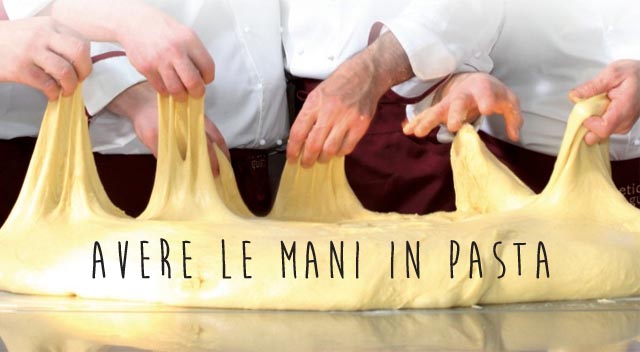
Ci sono un paio di espressioni che usano “pasta” come base della frase. Ad esempio, “avere le mani in pasta” significa di aver iniziato qualcosa, come un lavoro o un progetto, perché se hai letteralmente “le mani in pasta” che stai preparando da mangiare. Significa anche di essere molto ben collegato. Descrive una persona che sa bene l’arte di arrangiarsi. D’altra parte “Avere le mani di pasta frolla” non è così positivo. La pasta frolla è un impasto per fare i biscotti o le torte. Significa che qualcuno non è in grado di tenere qualcosa senza lasciarlo cadere, o quella persona è molto goffa.
A couple of expressions use “pasta” as the basis of the phrase. For instance, “Avere le mani in pasta” means to have started something, work, or a project, because, quite literally, your hands are in the dough that you are preparing to eat. It also means being very well-connected. You are someone who knows how to pull strings or make the right phone calls to get a job done. On the other hand, “Avere le mani di pasta frolla” isn’t as positive. La pasta frolla is pastry dough used to make cookies or cakes. It means that someone cannot hold something without dropping it or that person is very clumsy.
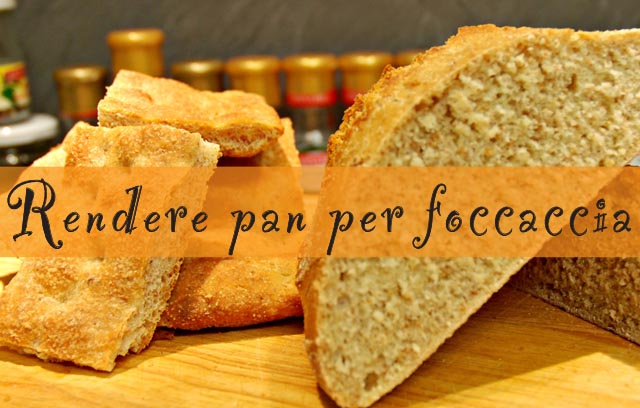
Un’altra bella espressione che usa pane è “rendere pan per focaccia” che significa in inglese “tit-for-tat” o per ottenere la tua vendetta in modo crudele. Secondo le mie fonti, il detto è apparso per la prima volta nel Decameron di Boccaccio nel 1350.
Another bread idiom is “Rendere pan per focaccia.” It means tit-for-tat or to get your revenge cruelly. According to my sources, the saying appeared first in Boccaccio’s Decameron back in 1350.
E per concludere, ecco un paio di detti che usano “vino” da abbinare con tutte queste espressioni sul cibo. “Botte piccolo fa vino buono” significa che anche le piccole botti producono un ottimo vino. Sarebbe l’equivalente dell’espressione inglese, “le cose buone arrivano in piccoli pacchetti.”
And to conclude, here are a couple of wine idioms to wash down all these food expressions. “Botte piccolo fa vino buono” means that even small casks make great wine. It would be the equivalent of the English expression, “Good things come in small packages.”
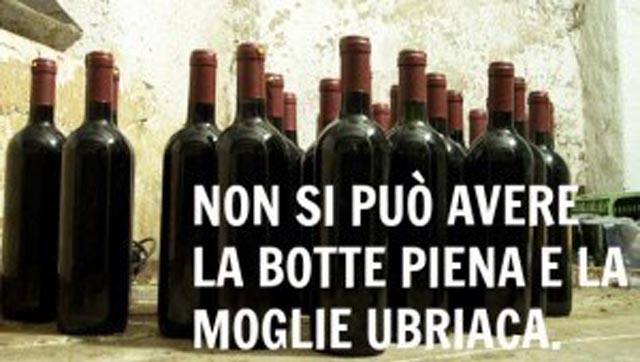
Ecco un’altra delle mie preferite: “Non puoi avere la botte piena e la moglie ubriaca.” In altre parole, non puoi avere il meglio di due cose contemporaneamente.
Here is another favorite of mine “Non puoi avere la botte piena e la moglie ubriaca.” You can’t have a full wine barrel and a drunk wife. Or in other words, you can’t have the best of both worlds.
C’è anche “l’acqua fa male e il vino fa cantare” o l’acqua ti rende depresso e triste – è una cosa senza sapore no – ma il vino è così delizioso da renderti felice farti cantare.
There is also “l’acqua fa male e il vino fa cantare” or the water makes you depressed and sad, but the wine is so delicious it makes you so happy you sing!
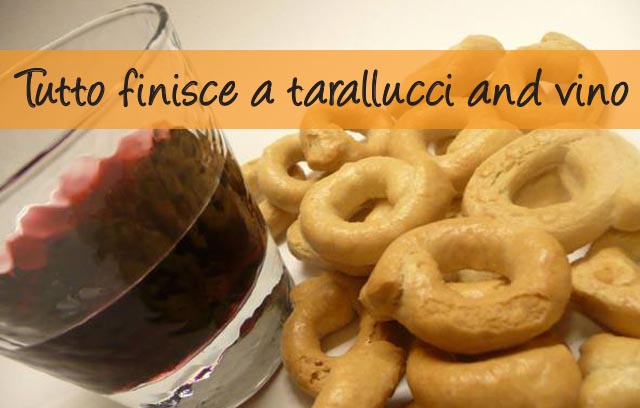
È infine “tutto finisce a tarallucci e vino. “Tutto finisce bene” come diciamo in inglese. Alla fine tutto si risolve. Gli italiani lo dicono spesso alla risoluzione dei disaccordi, grandi e piccoli. Deriva da una vecchia pratica in alcune regione d’Italia dove le controversie legali sono state concluse con una stretta di mano e un brindisi di vino rosso, insieme a un piatto di biscotti tarallucci a forma di anello.
And finally “Tutto finisce a tarallucci e vino.” Everything ends with biscuits and wine. All well, that ends, as we say in English. Everything always sorts itself out in the end. Italians often say this at the resolution of disagreements, whether minor or heated debates. It stems from an old practice in some regions of Italy where legal disputes were concluded with a handshake, a toast of red wine, and a plate of ring-shaped tarallucci cookies.
Va bene. Questo è tutto per ora. Mi sento un po’ affamata e assetata! E voi? Spero che questo video sui detti gastronomici non ti faccia dire: “Questa cosa mi fa venire il latte alla ginocchia” – che significa che avete trovato questo video noioso.
That’s it for now. I am feeling a bit hungry and thirsty! How about you? I hope this video about food idioms isn’t making you say, “Questa cosa mi fa venire il latte alle ginocchia” – which means you didn’t find this boring and make you want to turn it off.
Invece spero che tutto sia finito come tarallucci e vino! Ora andate a preparare una bella spaghettata e bevete un buon vino…e cantate! Alla prossima!
Instead, I hope it finished up like tarallucci e vino! Now go and have a nice spaghettata, drink some wine…e and sing! Until next time.
If you liked this video, I think you will like these too:
Moglie e Buoi dei paesi tuoi and other Italian Animal Idioms Buoi
Andare a Cavallo – riding a horse at the beach and useful Horse lingo
Italian idioms and tongue twisters
Siamo alla Frutta and other Italian Expressions
Fuori il rospo and other Italian expressions I find amusing
Liscio come l’olio and other Italian Expressions
Playing around in the Italian Language – Scherzi and barzellete
